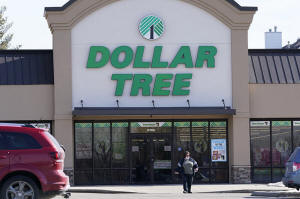Dollar Tree offloads Family Dollar chain for $1 billion, ending a
decade-long effort to find a fit
[March 27, 2025] By
MICHELLE CHAPMAN
Dollar Tree's decade-long effort to fold the Family Dollar chain into
its business is ending after agreeing to sell the bargain store chain to
a pair of private equity firms for $1 billion.
Dollar Tree Inc. bought Family Dollar with its over 7,000 stores ten
years ago for more than $8 billion.
Neil Saunders, managing director of GlobalData, said that Dollar Tree
struggled with supply chain issues, poor store locations and other
operational difficulties ever since making the acquisition.
“Basically, Dollar Tree bit off far more than it could chew,” he said.
Last year Dollar Tree announced that it planned to close hundreds of
Family Dollar stores.
Family Dollar carries a range of household staples, from food to laundry
detergent. The stores are largely located in underserved, urban areas.
Store closings that are underway, and those that may take place under
new ownership, are likely to have an outsized impact on customers living
in those areas.
Access to affordable, essential goods may become more challenging for
lower income families as more Family Dollar stores close, said Marshal
Cohen, chief industry advisor at Circana, a market research firm

“The lower income consumer will be losing a critical place to be able to
purchase value products," Cohen said. "They’re losing the breadth of the
assortment and the depth of the discount and the convenience.”
The mom and pop stores found in such densely populated urban areas have
less selection and prices are typically higher, Cohen said.
Dollar Tree had been scouting options for Family Dollar for a while and
said Wednesday that the sale to Brigade Capital Management and Macellum
Capital Management will allow it to focus on its core business.
“This is a major milestone in our multiyear transformation journey to
help us fully achieve our potential,” said Mike Creedon, who was made
permanent chief executive officer of Dollar Tree late last year.
During a conference call, Creedon noted how Dollar Tree and Family
Dollar are “two different businesses with limited synergies.” The sale
will now allow each one to concentrate on its specific needs, he added.
Dollar Tree, whose customer base is about 50% middle-income shoppers,
are found in many suburban locations. Its shelves are more likely to
feature seasonal goods, party supplies, crafts and snacks.
The sale will likely free Dollar Tree to focus on its core customers,
Truist Securities analyst Scot Ciccarelli believes.
“Family Dollar turnaround efforts had been consuming massive amounts of
both management focus and financial resources and now the company can
focus all of its efforts toward growing and optimizing Dollar Tree,” he
wrote in a client note.
[to top of second column] |

A woman leaves a Dollar Tree store in Urbandale, Iowa, on Feb. 25,
2021. (AP Photo/Charlie Neibergall, file)
 Bargain chains like Dollar Tree,
which have raised some of their prices in recent years, are finding
that they have little room to maneuver. Americans have tightened
their spending as consumer confidence in the economy slides.
Family Dollar, which moved its headquarters from North Carolina to
Chesapeake, Virginia, after the sale to Dollar Tree, will maintain
its headquarters in Virginia.
Saunders said Brigade and Macellum have to fix several issues at
Family Dollar, including pricing that isn’t as sharp as many of its
rivals and a customer base that isn’t as loyal.
The deal is expected to close later in the second quarter.
Arun Sundaram, an analyst with CFRA Research, said in a client note
that the Family Dollar sale is the right move for Dollar Tree, which
has historically generated stronger sales, profitability and cash
flow.
But Sundaram cautioned that Dollar Tree has increased exposure to
tariff risks due to its higher concentration in general merchandise
categories than Family Dollar.
While about half of the chain's customer base is middle income
shoppers, Creedon said that higher-income customers in store aisles
are becoming more frequent.
“We are seeing stronger demand from higher income customers who
increasingly see Dollar Tree as a cost effective source for an
expanding range of products,” he said.
Creedon said Dollar Tree has taken steps like negotiating cost
concessions and diversifying where it imports goods from to mitigate
more than 90% of the impact of the Trump administration's 10% tariff
on Chinese imports announced last month. That tariff would have cost
the company $15-$20 million monthly, Creedon said.

Another 10% tariff on goods from China that was announced this
month, along with 25% tariffs on Canada and Mexico, would
potentially have about another $20 million monthly impact. Creedon
said it's working to mitigate the impact of the latest round of
tariffs, which aren't reflected in Dollar Tree's 2025 outlook.
Shares of Dollar Tree rose 3% Wednesday.
__
AP Retail Writer Anne D'Innocenzio in New York contributed to this
story.
All contents © copyright 2025 Associated Press. All rights reserved |